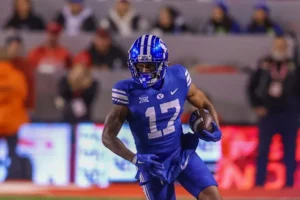
Shocking Loyalty: Tennessee Star Nico Lamaleava Turns Down $5.5 Million NIL Offers from Florida and Texas to Stay with Volunteers
Nico Lamaleava’s decision to turn down $5.5 million NIL (Name, Image, and Likeness) offers from Florida and Texas in favor of remaining with the Tennessee Volunteers is one that has sent shockwaves through the college football world. This move, showcasing a profound level of loyalty, is not only a rare display of commitment in an era where monetary incentives often drive athletes’ decisions but also a testament to the young quarterback’s belief in the Tennessee program and his relationship with the coaching staff, particularly head coach Josh Heupel.
Background of Nico Lamaleava
Nico Lamaleava, a highly touted quarterback prospect out of Long Beach, California, has been one of the most sought-after recruits in recent years. Known for his impressive arm strength, mobility, and leadership on the field, Lamaleava quickly rose to prominence in high school football, attracting offers from several elite college programs. His skill set made him a natural candidate for the title of a future star in college football, with a trajectory that many analysts predicted would include early entry into the NFL Draft.
As the top quarterback in his recruiting class, Lamaleava’s decision on where to attend college was always going to be under intense scrutiny. However, in today’s landscape of college athletics, where NIL deals have become a significant factor in recruitment, the conversation quickly shifted from just his talent on the field to the lucrative financial offers he would receive.
The Rise of NIL and Its Impact on College Football
The introduction of NIL rights for college athletes in 2021 has had a profound effect on the recruiting landscape. No longer are athletes solely dependent on scholarship offers and traditional means of financial support; now, they have the opportunity to profit from their personal brand. This has made schools with deep pockets, like Florida and Texas, particularly appealing to high-profile recruits.
In Lamaleava’s case, both the University of Florida and the University of Texas presented him with massive NIL offers that reportedly totaled $5.5 million. These deals, backed by robust booster networks and collective groups, were designed to secure his commitment and make the Gators and Longhorns serious contenders for his services.
For many recruits, the allure of such staggering sums of money, especially at the beginning of their college careers, can be hard to resist. NIL offers have become an integral part of the recruitment process, with schools aggressively competing to offer the most attractive financial packages. Yet, Lamaleava’s decision to reject these offers and remain loyal to Tennessee speaks to a deeper, more personal reason for his commitment to the Volunteers.
Tennessee’s Role in Lamaleava’s Decision
Tennessee was not considered to be a major player in the NIL bidding war for Lamaleava, at least not in terms of the financial backing that programs like Florida and Texas could offer. However, the Volunteers’ program provided Lamaleava with something that money alone couldn’t buy—trust, development, and a vision for the future.
The recruitment of Lamaleava by Tennessee was built not just on the allure of immediate success but on the long-term development of a quarterback who could become the centerpiece of the Volunteers’ offense for years to come. Head coach Josh Heupel, known for his offensive acumen and ability to develop quarterbacks, made Lamaleava a priority from the moment he stepped foot on campus. Heupel’s offensive system, which values the spread offense and explosive plays, was a natural fit for Lamaleava’s skill set, and it was evident that Heupel had a clear plan for how to maximize his potential.
For Lamaleava, this relationship with Heupel was one of the key factors in his decision to turn down the NIL offers from Florida and Texas. The trust and respect between player and coach went beyond just X’s and O’s. Heupel showed an investment in Lamaleava as a person, not just as a commodity. This personal connection, along with the vision for success at Tennessee, played a pivotal role in Lamaleava’s loyalty.
Tennessee, too, offered something that money alone couldn’t replicate: a program with a passionate fanbase, rich tradition, and a growing reputation as a rising power in college football. Lamaleava understood that success at Tennessee could potentially be more rewarding than jumping ship to a program with a larger financial backing but less certainty about long-term success.
The Pressure of NIL Offers
It’s important to understand the pressure that Lamaleava faced in the wake of such substantial NIL offers. For many young athletes, particularly those coming from modest backgrounds, a $5.5 million offer can seem like a life-changing sum of money. It’s easy to see how many recruits would prioritize financial security over loyalty to a program.
However, Lamaleava’s decision demonstrates a unique maturity and foresight. Rather than making a quick financial decision, Lamaleava took the time to consider his future both on and off the field. He recognized that the right program would offer not only financial stability but also the opportunity to develop as a player and reach his full potential.
While Tennessee may not have been able to match the NIL offers of Florida and Texas dollar-for-dollar, they were able to provide Lamaleava with something more valuable: a platform to showcase his talent in an offense tailored to his strengths and a team poised for national contention. This holistic approach, focusing on his development as a player and his place within the Tennessee football program, was more appealing to Lamaleava than the short-term financial gains offered by the other schools.
The Cultural Shift in College Athletics
Lamaleava’s decision is reflective of a broader cultural shift within college athletics. While the NIL era has certainly introduced new challenges and considerations, it has also highlighted the importance of loyalty and long-term vision for many student-athletes. The story of Lamaleava choosing to stay with Tennessee over large financial incentives is a reminder that athletes, even in an age dominated by NIL, are still driven by values such as loyalty, personal growth, and the desire to build something meaningful.
In a sense, Lamaleava’s story counters the prevailing narrative that college athletes are solely motivated by financial gain. His decision is a reminder that, while NIL deals may provide athletes with unprecedented earning potential, there are still some recruits who prioritize the intangible aspects of college life—the coaching, the team chemistry, and the opportunity to grow both as a player and as a person.
For Tennessee, Lamaleava’s commitment is a monumental win. It is a victory not just in terms of recruiting, but also in proving that their program can compete at the highest level of college football, even without the financial might of some of the more established programs. Lamaleava’s decision shows that the Volunteers are not only a place for elite talent but also a program where players can flourish without the pressures of choosing financial gain over personal development.
Looking Ahead: What Lamaleava’s Loyalty Means for Tennessee
Lamaleava’s decision to stay with Tennessee has far-reaching implications for both his future and the future of the Volunteers’ football program. As the centerpiece of the team’s offense, Lamaleava has the opportunity to build a legacy at Tennessee and potentially lead the program to a national championship. His decision to remain loyal to the Volunteers could inspire future recruits who value development, coaching, and a strong team culture over the immediate financial rewards offered by rival programs.
For Tennessee, keeping Lamaleava in the fold represents a significant win not just on the recruiting trail but in terms of program stability and growth. The Volunteers have been on the rise under Heupel’s leadership, and with Lamaleava as their quarterback, the team has the potential to reach new heights. His commitment solidifies Tennessee as a destination program for top-tier recruits, particularly those who value the coaching staff and long-term development over short-term financial incentives.
Nico Lamaleava’s decision to turn down a $5.5 million NIL offer and remain with Tennessee is a testament to his loyalty and his belief in the Volunteers’ program. In an era where NIL deals often dictate the decisions of college athletes, Lamaleava’s choice represents a refreshing change and highlights the importance of factors beyond money, such as coaching, team culture, and personal growth. His commitment to Tennessee could have a profound impact on the future of the program, and it may serve as an example for future recruits who prioritize long-term success and development over immediate financial rewards. Lamaleava’s decision has sent a powerful message to the world of college football: loyalty still matters.





